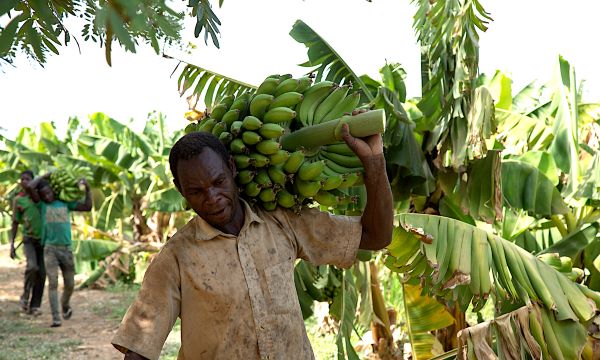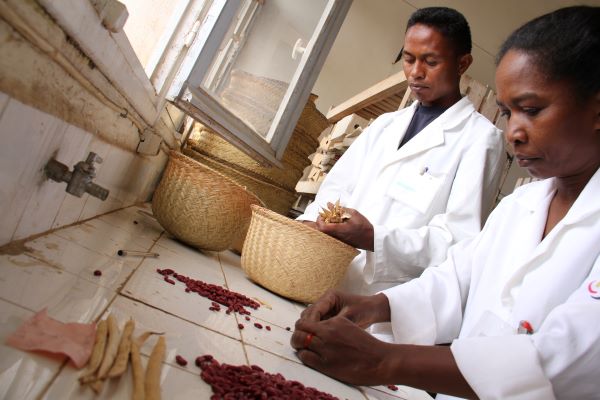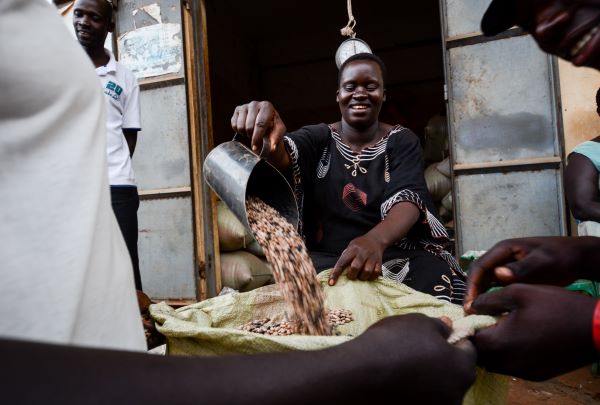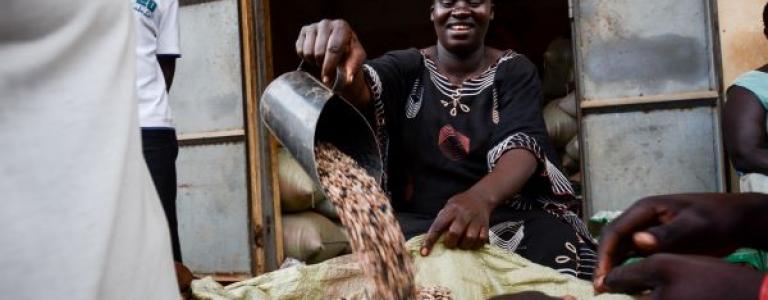We Need a Global Stimulus Package to Avoid a COVID-19 Hunger Crisis
The loss of income for billions of people could be the most devastating effect of the COVID-19 pandemic, and it's directly connected to a pending hunger crisis.
COVID-19 has hit hard, fast and everywhere. It is, above all, a public health crisis and addressing it as such is today’s most critical challenge. But already the links to other crises are emerging, and none is as urgent as the pending hunger crisis.
Just over 10 years ago, global food security suffered a huge shock when prices of staples like wheat, rice, and maize entered a prolonged period of high and volatile prices. On the heels of the food price crisis came the 2008 financial crisis and a global recession. Meanwhile, the slower-acting but no less devastating effects of climate change continued unabated, associated with more frequent and intense floods, droughts, and extreme weather events. The combined effects of conflict, climate change, and economic recession have led to a steady rise in hunger worldwide over the past three years, after decades of abatement.
For most of the world, there is no public provision for lost income, and for far too many, each day’s income is needed for that day’s food.
Last year, a global economic slowdown was one of the main reasons an additional 20 million people were added to the hunger count. Hunger rose not because there was a shortage of food, but because people couldn’t afford to buy it.

The economic shutdown currently being imposed to fight coronavirus is unprecedented. India, home to the largest number of people affected by hunger (around 190 million people) has already shut down half its economy. Sub-Saharan Africa, with the highest proportion of people affected by hunger (20 percent of the population) is starting to shut down too.
The loss of income for billions of people could be the most devastating effect of the COVID-19 crisis. Over one million people filed for unemployment benefits in Canada last week alone. For most of the world, however, there is no public provision for lost income, and for far too many, each day’s income is needed for that day’s food.

Not all countries can afford the kinds of stimulus packages and safety nets coming into play in the rich world. In the United States, the government has allocated USD 2 trillion for the crisis—the equivalent of 10 percent of national GDP. The prime minister of Ethiopia, Abiy Ahmed, said in a letter to the Financial Times last week that African countries “lack the wherewithal to make similarly meaningful interventions.” He called for a strategy that is “global in design and application…global action guided by a sense of global solidarity.”
In short, we need a global stimulus package to fight a COVID-19 hunger crisis.
A global stimulus package must first and foremost provide social protection for the millions of people in low- and middle-income countries who have lost their income. Since the food supply is not currently in jeopardy, and as long as access to food markets is maintained, protection should be in the form of basic cash transfers or minimum income payments. School feeding programs must also be maintained even as schools are shut down, to continue the provision of nutritious meals to children.
School feeding programs must also be maintained even as schools are shut down, to continue the provision of nutritious meals to children.
Second, the package should support the public budgets of low-income countries that are dependent on food imports to make up shortfalls in the supply of basic foods. These net-food importing countries rely on foreign exchange earnings to pay for imports that are essential to the national food supply. With the economic shutdown, many countries may no longer earn sufficient foreign currency to pay for cereal imports.

Third, an effective global stimulus package also requires other countries to do no harm. That means curtailing export bans on food staples. For now, food supply chains are functioning and basic staples are well supplied. There is no immediate reason to fear shortages of basic staples. But restrictive trade measures, particularly export bans, destabilize markets and could exacerbate high and unstable prices as happened in 2007-08. The International Food Policy Research Institute (IFPRI) is tracking these measures and already some countries have imposed bans.
Fourth, we need a new type of public investment in the global food system, not just a return to the status quo. This means investing in food systems that not only support stable and sufficient calorie supplies but also improved nutrition, micronutrient availability, and reverses the rise in obesity and non-communicable diseases.
We need a new type of public investment in the global food system, not just a return to the status quo.
It means both reducing greenhouse gas emissions from agriculture and building resilient rural communities that can cope with the effects of climate change. And it means improving the income and livelihoods of small-scale producers, reducing their vulnerability to global shocks and crises.
Saving lives is paramount in a pandemic. But as governments take an unprecedented role in economies around the world, it is timely to remember that human health depends not just on protection from a virus, but also access to a sufficient and nutritious diet. Our public response must be bold and encompassing to match the scale of the challenge facing us all.
This article originally appeared in foodtank; it has been reprinted with permission.
You might also be interested in
Promoting the Development of Agricultural Cooperatives
Governments in the Global South should promote agricultural cooperatives to boost smallholder access to fair markets, finance, and climate resilience.
What Will Happen at COP 29?
Talks at the 2024 UN Climate Change Conference (COP 29) will range from defining a way forward on finance through a new collective quantified goal (NCQG) to mitigation, and loss and damage. Ahead of negotiations in Baku, IISD’s Earth Negotiations Bulletin Team Lead Jennifer Bansard examines the agenda and breaks down what to watch as eyes turn to Azerbaijan.
Adding Fuel to the Fire: How export restrictions can exacerbate climate change’s impacts on global food security
Higher temperatures will likely reduce agricultural yields and production in most countries, raising global food prices and worsening food security. Avoiding export restrictions is crucial.
Women Turning the Table on Food Loss and Waste in Kenya
A group of changemakers led a movement to tackle food loss and waste in Kenya. IISD experts have been working closely with local women leaders to make change happen.
